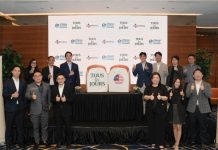- Malaysia to be “almost cashless” by 2025
- Honda Malaysia Invests RM11 mln to Expand Parts Warehouse
- Tibco, Singapore Polytechnic collaborate to address SME skills shortage
- JD.com and Fung Retailing Form Artificial Intelligence Partnership
- China’s Insurance Industry Expects to Grow

Transactions in Malaysia To Be Almost ‘Cashless’ By 2025 — Nazir
Transactions in Malaysia are projected to be almost ‘cashless’ by 2025, given rate of development in today’s technology, coupled with the fierce race to profit from optimising technology in banking, says CIMB Group Chairman, Datuk Seri Nazir Razak. In an article, titled ‘Thriving in a Disrupted World’, Datuk Seri Nazir said, if this projection materialised, automated teller machines would seem as retro as phone booths were today and bank branches would also become a rare sight. “Robotics and artificial intelligence will have displaced a large percentage of asset managers and credit analysts, and maybe even investment bankers. Peer-to-peer interactions among customers themselves will have disintermediated banks in more and more ways. “Similarly, blockchain and its automated ledger functions, as well as cryptocurrencies, will have proliferated new methods of trade finance and money transfers that bypass banks altogether,” he said. He said among the biggest threats to banks were giant platform companies and in giving example, he said, China’s two largest platforms, Alibaba and Tencent, had both set up licensed banks to provide consumer loans with near-instant credit decision-making by analysing the massive accumulated customer behavioural data in their possession.
Honda Malaysia Invests RM11 mln to Expand Parts Warehouse
Honda Malaysia has completed phase two expansion of its parts warehouse in Shah Alam to further support rising after-sales demand, which grows in tandem with the increased sales and service intakes. A company statement said it had invested RM11 million to expand the storage capacity of the current warehouse to a total built-up area of 21,700 square metres, to support the parts requirements of its 93 dealers in Malaysia. “The expansion not only increases storage space but also improves warehousing operations, speeds up delivery of parts to dealers and customers, and accommodates Honda’s future business growth,” it said. Managing Director and Chief Executive Officer, Toichi Ishiyama, said the sales growth and service intakes had increased in the last four years which reflected the increase in demand for spare parts. “Sales of spare parts recorded a growth of 32 per cent while demand arising from body and paint activities rose 48 per cent in 2017 against the that in 2016,” Ishiyama said.
Tibco, Singapore Polytechnic collaborate to address SME skills shortage
TIBCO Software Inc., a global leader in integration, API management, and analytics, will collaborate with Singapore Polytechnic (SP) to expand data analytics capabilities and knowledge in Singapore among local engineering Small-Medium Enterprises (SMEs). As part of the Memorandum of Understanding (MOU), SP, Tibco, and its partner, iZeno, will jointly engage students through industrial practice, internships, and other practice-based training. The collaboration will focus on students from the Computer Engineering, Engineering with Business, and Engineering Systems diploma courses, acquiring relevant data analytics skillsets in the areas of Industry 4.0 and advanced manufacturing. In addition to full-time students, adult learners from relevant Continuing Education (CET) courses will also be trained in data analytics. This latest initiative will help address the current data skills shortage faced by local engineering SMEs.
According to Singaporean-German Chamber of Industry and Commerce, the rapid development of Industry 4.0 will see a decrease in the reliance for low-skilled labourers doing routine tasks as automation takes place. Singapore’s engineering industry will require cross-competence skills, big data specialists, data integration experts, and cloud capacity managers in order to reap the benefits of Industry 4.0.
JD.com and Fung Retailing Form Artificial Intelligence Partnership
Fung Retailing Limited, with a network of over 3,000 stores, and JD.com, China’s largest retailer, today announced a partnership to develop AI-driven retail solutions. According to the agreement signed today, the two companies will cooperate in using AI to transform the retail landscape, and to collaborate in areas including AI platform development and the application of AI to smart retail. The agreement calls for the establishment of an AI Boundaryless Retail Center that will oversee and manage cooperative research and development projects, and facilitate the sharing of information and expertise relating to AI technology. Leveraging AI, and combining JD.com’s extensive online expertise and Fung Retailing’s offline expertise, the two companies aim to develop a new retail format for China and Asia. This includes creating an AI-driven retail system that seamlessly integrates online and offline retail platforms; developing an end-to-end system that enables the management of products, pricing, storage, order and payment; and enhancing consumer experience through solutions such as AI-driven virtual fitting, unmanned stores and smart shopping assistants.
China’s Insurance Industry Expects to Grow
China’s insurance industry is expected to continue to grow, with new rules on short-term life products and growth in non-motor property insurance. A.M. Best senior financial analyst, Vivian Cheung who gave this scenario in a A.M.BestTV episode, said this would aid the market momentum. “In 2016, the main factor driving growth in the China insurance sector was growth in the life insurance sector, which grew by a remarkable 36 per cent year over year. “The growth was mainly driven by relaxation by the Chinese regulator on guaranteed investment returns, so that life insurers could offer more short-term products with investment returns that were more attractive than those offered by the banks,” said Cheung. For the non-life insurance sector, the growth was mainly coming from the non-motor segment, particularly the credit and liability sectors. A.M. Best is the world’s oldest and most authoritative insurance rating and information source.
























